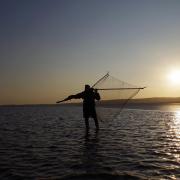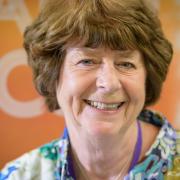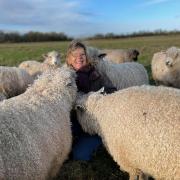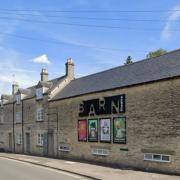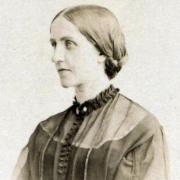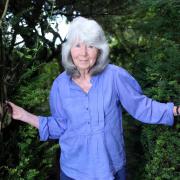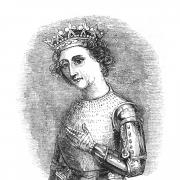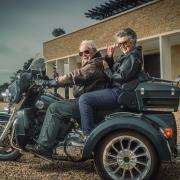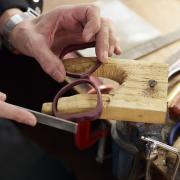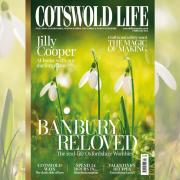Adrian Partington is a conductor, chorus master, pianist and organist ... and also director of music at Gloucester Cathedral. Katie Jarvis asked him about his Cotswold life
‘Versatility’ is a word often used to describe Adrian Partington. And understandably so, for he has achieved success as a conductor, chorus master, pianist and organist. “I suppose it’s indicative of a character weakness that I’ve never decided which way I wanted to go, so I use all the gifts that I’ve been fortunate enough to receive as well as I can,” he says, with considerable understatement.
He is artistic director of the BBC National Chorus of Wales, conductor of the Bristol Choral Society and director of the new choral conducting course at the Royal Welsh College of Music and Drama. In January last year, he became director of music at Gloucester Cathedral and joint conductor of the Three Choirs Festival, which the city will host in 2010.
He had his wife Clare, who runs an alternative therapy practice, have five children: Tom, 26, a social worker in Tewkesbury; Ben, 17, a music tech student; Miriam, 14, at school in Newent; Jacob, 10, a Gloucester Cathedral chorister; and Joey, 6, a pupil at The Milestone School.
Where do you live and why?
I live in a beautiful little close called Miller’s Green, right next to Gloucester Cathedral, because that is the director of music’s house, and has been for a very long time. It’s an ancient building and, though I was totally sceptical and cynical, I’m now convinced there are ghosts here. I have seen a young girl in a smock with long, flowing hair walk through our bedroom. Thinking it was our daughter, I called out to her but she ignored me and disappeared into a cupboard, which used to be a doorway into the adjacent house.
How long have you lived in the Cotswolds?
We moved here in January last year. The house is optional but it would be quite difficult to do the job without living right by the side of the cathedral because the hours are just crazy. On Mondays, for example, I do a 14-hour day, which most people wouldn’t tolerate. We still have our house near Ross-on-Wye, which was idyllic: totally peaceful. The house we’re in now is very different – elegant and fantastically convenient for the children – and quiet during the day, but noisy at night because the Close is kept open.
What's your idea of a perfect weekend in the Cotswolds?
To go for a brisk walk on a Saturday morning; a good pub lunch; then home for a sleep in the afternoon.
If money were no object, where would you live in the Cotswolds?
I’m very keen on being high up: somewhere overlooking the Windrush would do nicely. I’d like a separate stone converted barn as a music studio, and there would have to be a stream rushing down the hill next to the house.
Where are you least likely to live in the Cotswolds?
In the middle of one of the nevertheless-charming towns, such as Stow-on-the-Wold. I live in Gloucester because it’s practical and because the rest of the family wanted to move into a town. The teenagers can come and go as they please; Jacob, the chorister, can be in the cathedral in 30 seconds and can walk to The King’s School on his own. Clare was utterly fed up of being in the middle of the country; she likes being in the centre of things. I lost: no question!
Where's the best pub in the area?
I don’t go to pubs like I used to, but I do occasionally go with the cathedral lay clerks to the Fountain, just by the main gate. It’s very old, which I find inspiring: I think about the history of Gloucester all the time. A large proportion of the great British composers of the last 100-150 years have intimate connections with the city, and with the cathedral in particular: Vaughan Williams and Ivor Gurney were Gloucester men; Holst was a Cheltenham man; Herbert Howells came from Lydney. I’d be so bold as to say that, outside London, there’s nowhere in the country with so much musical heritage as Gloucester.
And the best place to eat?
I hardly ever go out except when I’m on my own working. As a family, we tend to go for an Indian locally, but we’re very rarely all together. I’m afraid I’m not an old-fashioned father who insists on people turning up to Sunday lunch.
What would you do for a special occasion?
We’d stay here and celebrate. My greatest experiences have taken place when I’ve been conducting, and I’m proud to say that a lot of them have happened since I’ve been in Gloucester. Conducting in the Three Choirs Festival this year was a very special occasion, especially as one of the reviewers said it matched what was offered at the London Proms.
What's the best thing about the Cotswolds?
Hearing young people sing - and I’m not necessarily talking about the cathedral choristers. We have a great outreach programme from the cathedral where we go into primary schools, which all come together for a concert with the cathedral choir once a term. I’ve started a Gloucester Choral Society young singers’ programme – very exciting – for 14-18-year-olds. And I’m also starting a new chorus – the Three Choirs Festival Singers - for singers aged 16-25. We have all of us got to find a way to let our heritage live on: British choral tradition is absolutely unique and, without my generation making an effort, it could easily dwindle. There are so many other attractions for young people that the thought of singing in a choir for a couple of hours on a Monday evening is very low on the agenda. That’s partly because they haven’t had a massive amount of choral singing in schools; but, once introduced to it, there are very few that don’t thereafter make it a part of their lives.
What's your favourite view in the Cotswolds?
One that always stuns me is driving from Ledbury to Gloucester where, for a few minutes, you can see the cathedral tower, and Birdlip on top of the hill, but you cannot see the city of Gloucester. Each time, I’m reminded of the medieval pilgrims who walked, perhaps from Worcester, who’d see the tower as they came over the brow of the hill. It’s quite extraordinary that this same view has continued existing without being attacked by development.
What's your quintessential Cotswolds village and why?
I don’t know the distinction between villages and towns but Burford is the place I feel epitomises the Cotswolds.
Name three basic elements of the Cotswolds…
The essence of the Cotswolds to me is Vaughan Williams because his music has a total Englishness. Sometimes he’s angry and sometimes he’s violent but a lot of his music has Gloucestershire written all over it. In The Lark Ascending, I can see an English meadow; I can see the colours you can only see in England, our now-increasingly shabby little island: overpopulated, industrialised yet, whenever I go anywhere else in the world, I yearn for it.
Then there’s Holst, born and brought up in Cheltenham. When he was a poor trombonist trying to earn his living, he used to walk from London back home to Cheltenham. It would take him three or four days in the summer and he would sleep rough. There’s a wonderful story of Holst stopping for a rest and deciding to get his trombone out, which he always carried slung on his back, and beginning to play in the open air. You just can’t imagine anyone doing that anymore.
And the third is a dear man, not as famous, called Herbert Howells, who was once an articled pupil in Gloucester – kind of an assistant organist. I was so proud to have been taught by him at the Royal College of Music in the 1970s when he was a very old man. When he should have been talking about composition, he talked about his roots in Gloucestershire.
The best English music is not in-your-face like German and French music; it’s controlled and subtle, often with a strong streak of sadness. If you think of The Lark Ascending, it should be happy but it makes most people very tearful.
What's your favourite Cotswolds building and why?
I can’t say anything but Gloucester Cathedral, particularly the Lady Chapel because it’s beautiful in its own right. It has a fantastic acoustic; and it has singing galleries, three of them, which were common in many cathedrals of the late Middle Ages but have mostly gone elsewhere in the country. The whole place, to me, is a symbol of the high point of Christianity. That’s a terribly controversial thing to say and I’m not saying I’m a Roman Catholic; but, in the late Middle Ages, life and religion walked hand in hand in a way they’ve not done since. I can only compare it to the all-embracing positive influence of Islam on its followers, where they really live their religion.
What would you never do in the Cotswolds?
I’d never again upset Samuel Sebastian Wesley, a giant of 19th century cathedral music, who died in our front room: it’s still called the Wesley room today. He was one of my most famous predecessors and one of the great Wesley clan of hymn-writers, preachers and musicians. On our first day here, I put quite securely on the wall of ‘his’ room a large limited edition picture of The Dream of Gerontius, which had been given to me when I left the City of Birmingham Symphony Orchestra. During the night, there was this terrific crash and it fell off. I drew the conclusion that Wesley was not very keen on the fact that Elgar’s picture was on his wall. So I decided to put lots and lots of Samuel Sebastian Wesley’s music down on the Gloucester Cathedral music list, which seems to have cheered him up!
If you lived abroad, what would you take to remind you of the Cotswolds?
This is boring but I genuinely mean it: I would take some musical scores, for work and for pleasure. If I had to choose one, I think it would have to be The Dream of Gerontius.
Which event, or activity, best sums up the Cotswolds?
The Three Choirs Festival: next year is very exciting for me. I have, simply self-indulgently, included music that I enjoy, though I’ve also tried to be balanced. It’s slanted towards the English with lots of Elgar, Vaughan Williams, and Gurney, but we’re going outside the British Isles, too, with Venetian music and a big Mozart programme. The week, however, begins and ends in the South West Midlands, with Elgar, Holst and Parry, another Gloucestershire composer. On the last night, we are reviving what I consider to be Parry’s masterpiece, Ode on the Nativity: soft, restrained but underlyingly passionate English music; very lyrical; very wonderful.
If you were invisible for a day, where would you go and what would you do?
I certainly wouldn’t want to spy on anybody because I think privacy, of which I have very little, is something to be prized. What would interest me far more is to get into a time machine because there are so many people in the musical world I would wish to meet. One of them is Franz Schubert; his music has such a painfully beautiful quality. He died so young and he wasn’t a great letter writer: I would very much like to get to know him.
With whom would you most like to have a cider?
With Elgar. He was terribly fond of games and puzzles and there are all sorts of things I would like to ask him. But the main question – and this is a terrible one - is which woman in his life he really loved. Everybody has a different opinion about it – even those who knew him. It’s a subject deliberately veiled in secrecy and obscuration.



